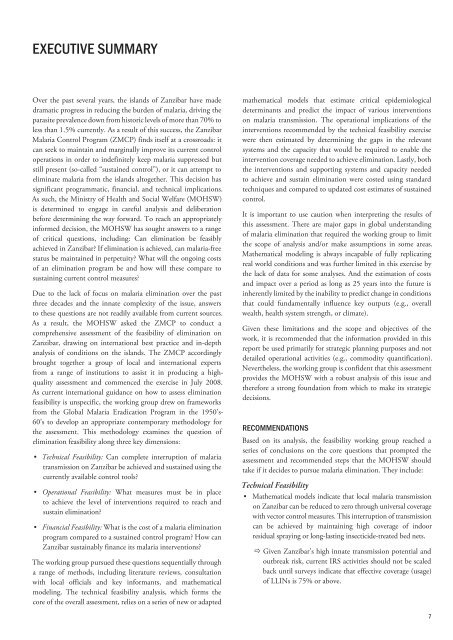MALARIA ELIMINATION IN ZANZIBAR - Soper Strategies
MALARIA ELIMINATION IN ZANZIBAR - Soper Strategies
MALARIA ELIMINATION IN ZANZIBAR - Soper Strategies
You also want an ePaper? Increase the reach of your titles
YUMPU automatically turns print PDFs into web optimized ePapers that Google loves.
EXECUTIVE SUMMARY<br />
Over the past several years, the islands of Zanzibar have made<br />
dramatic progress in reducing the burden of malaria, driving the<br />
parasite prevalence down from historic levels of more than 70% to<br />
less than 1.5% currently. As a result of this success, the Zanzibar<br />
Malaria Control Program (ZMCP) finds itself at a crossroads: it<br />
can seek to maintain and marginally improve its current control<br />
operations in order to indefinitely keep malaria suppressed but<br />
still present (so-called “sustained control”), or it can attempt to<br />
eliminate malaria from the islands altogether. This decision has<br />
significant programmatic, financial, and technical implications.<br />
As such, the Ministry of Health and Social Welfare (MOHSW)<br />
is determined to engage in careful analysis and deliberation<br />
before determining the way forward. To reach an appropriately<br />
informed decision, the MOHSW has sought answers to a range<br />
of critical questions, including: Can elimination be feasibly<br />
achieved in Zanzibar? If elimination is achieved, can malaria-free<br />
status be maintained in perpetuity? What will the ongoing costs<br />
of an elimination program be and how will these compare to<br />
sustaining current control measures?<br />
Due to the lack of focus on malaria elimination over the past<br />
three decades and the innate complexity of the issue, answers<br />
to these questions are not readily available from current sources.<br />
As a result, the MOHSW asked the ZMCP to conduct a<br />
comprehensive assessment of the feasibility of elimination on<br />
Zanzibar, drawing on international best practice and in-depth<br />
analysis of conditions on the islands. The ZMCP accordingly<br />
brought together a group of local and international experts<br />
from a range of institutions to assist it in producing a highquality<br />
assessment and commenced the exercise in July 2008.<br />
As current international guidance on how to assess elimination<br />
feasibility is unspecific, the working group drew on frameworks<br />
from the Global Malaria Eradication Program in the 1950’s-<br />
60’s to develop an appropriate contemporary methodology for<br />
the assessment. This methodology examines the question of<br />
elimination feasibility along three key dimensions:<br />
�� Technical Feasibility: Can complete interruption of malaria<br />
transmission on Zanzibar be achieved and sustained using the<br />
currently available control tools?<br />
�� Operational Feasibility: What measures must be in place<br />
to achieve the level of interventions required to reach and<br />
sustain elimination?<br />
�� Financial Feasibility: What is the cost of a malaria elimination<br />
program compared to a sustained control program? How can<br />
Zanzibar sustainably finance its malaria interventions?<br />
The working group pursued these questions sequentially through<br />
a range of methods, including literature reviews, consultation<br />
with local officials and key informants, and mathematical<br />
modeling. The technical feasibility analysis, which forms the<br />
core of the overall assessment, relies on a series of new or adapted<br />
mathematical models that estimate critical epidemiological<br />
determinants and predict the impact of various interventions<br />
on malaria transmission. The operational implications of the<br />
interventions recommended by the technical feasibility exercise<br />
were then estimated by determining the gaps in the relevant<br />
systems and the capacity that would be required to enable the<br />
intervention coverage needed to achieve elimination. Lastly, both<br />
the interventions and supporting systems and capacity needed<br />
to achieve and sustain elimination were costed using standard<br />
techniques and compared to updated cost estimates of sustained<br />
control.<br />
It is important to use caution when interpreting the results of<br />
this assessment. There are major gaps in global understanding<br />
of malaria elimination that required the working group to limit<br />
the scope of analysis and/or make assumptions in some areas.<br />
Mathematical modeling is always incapable of fully replicating<br />
real world conditions and was further limited in this exercise by<br />
the lack of data for some analyses. And the estimation of costs<br />
and impact over a period as long as 25 years into the future is<br />
inherently limited by the inability to predict change in conditions<br />
that could fundamentally influence key outputs (e.g., overall<br />
wealth, health system strength, or climate).<br />
Given these limitations and the scope and objectives of the<br />
work, it is recommended that the information provided in this<br />
report be used primarily for strategic planning purposes and not<br />
detailed operational activities (e.g., commodity quantification).<br />
Nevertheless, the working group is confident that this assessment<br />
provides the MOHSW with a robust analysis of this issue and<br />
therefore a strong foundation from which to make its strategic<br />
decisions.<br />
RECOMMENDATIONS<br />
Based on its analysis, the feasibility working group reached a<br />
series of conclusions on the core questions that prompted the<br />
assessment and recommended steps that the MOHSW should<br />
take if it decides to pursue malaria elimination. They include:<br />
Technical Feasibility<br />
�� Mathematical models indicate that local malaria transmission<br />
on Zanzibar can be reduced to zero through universal coverage<br />
with vector control measures. This interruption of transmission<br />
can be achieved by maintaining high coverage of indoor<br />
residual spraying or long-lasting insecticide-treated bed nets.<br />
! Given Zanzibar’s high innate transmission potential and<br />
outbreak risk, current IRS activities should not be scaled<br />
back until surveys indicate that effective coverage (usage)<br />
of LL<strong>IN</strong>s is 75% or above.<br />
7


